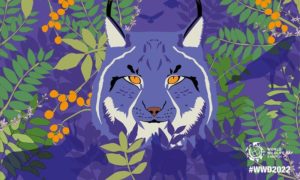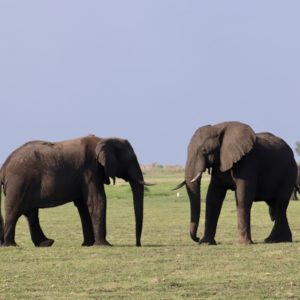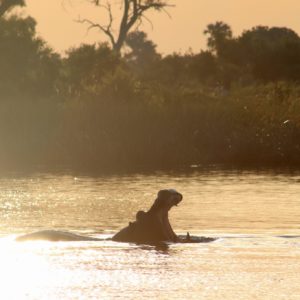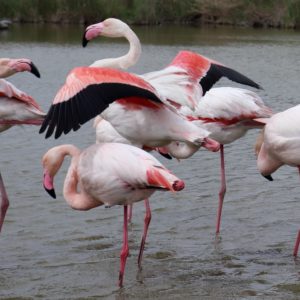Update
Celebrating World Wildlife Day 2022 in Geneva and Beyond
World Wildlife Day, celebrated each year on 3 March, commemorates the day of signature of the Convention on International Trade in Endangered Species of Wild Fauna and Flora (CITES) in 1973. The theme for 2022 is "Recovering key species for ecosystem restoration".
About World Wildlife Day
World Wildlife Day celebrates the beautiful and varied forms of wild fauna and flora and to raise awareness of the multitude of benefits that their conservation provides to people. At the same time, World Wildlife Day reminds us of the urgent need to step up the fight against wildlife crime and human-induced reduction of species, which have wide-ranging economic, environmental and social impacts. Each year, World Wildlife Day is celebrated on 3 March, the day of signature of the Convention on International Trade in Endangered Species of Wild Fauna and Flora (CITES) in 1973.
2022 Theme
World Wildlife Day 2022 was held under the theme “Recovering key species for ecosystem restoration” to raise awareness of the state of endangered and critically endangered wildlife, and to highlight the power of conservation efforts seeking to reverse their fate. Leading up to the year when the post-2020 Global Biodiversity Framework is expected to be adopted, drawing attention to the status of some of the most critically endangered species of wild fauna and flora and their role in ecosystems sends a powerful message for urgent commitment. The theme also highlights the impact of conservation efforts and promote best practice examples where species were brought back from the brink, and it will drive discussions towards imagining and implementing new solutions to conserve and sustainably use others.
Biodiversity loss is an existential threat to people and planet. The continued loss of wildlife species threatens to undermine entire ecosystems and puts into peril the well-being of all who rely on them. Yet, this is not inevitable: we have the power to change course and restore threatened species and their habitats. With the theme of “Recovering key species for ecosystem restoration”, we wish to inspire action towards reversing the fate of key species of animals and plants. It is our hope that World Wildlife Day will help chart a path towards a sustainable future, with the goal of living in harmony with nature. Ultimately, we hope to spur on the needed political will to adopt a robust post 2020 Global Biodiversity Framework and secure our common future.
— CITES Secretary-General Ivonne Higuero, 15 November 2021
According to figures by the International Union for Conservation of Nature’s Red List of Threatened Species, over 8,400 species of wild fauna and flora are critically endangered, while close to 30,000 more are understood to be endangered or vulnerable. Based on these estimates, it is suggested that over a million species are threatened with extinction. Continued loss of species and degradation of habitats and ecosystems threatens humanity as a whole, as people everywhere rely on wildlife and biodiversity-based resources to meet all their needs, from food, medicines and health to fuel, housing, and clothing.
The celebrations seek to draw attention to the conservation status of some of the most critically endangered species of wild fauna and flora, and to drive discussions towards imagining and implementing solutions to conserve them. All conversations were inspired by and seek to inform efforts towards the achievement of UN Sustainable Development Goals 1 (No Poverty), 2 (Zero hunger) 12 (Ensure sustainable consumption and production patterns), 13 (Climate Action) 14 (Life Below Water) and 15 (Life on Land).
UN Decade on Ecosystem Restoration
Launched on World Environment Day 2021, the UN Decade on Ecosystem Restoration is a rallying call for the protection and revival of ecosystems all around the world, for the benefit of people and nature. The UN Decade runs from 2021 through 2030, which is also the deadline for the Sustainable Development Goals and the timeline scientists have identified as the last chance to prevent catastrophic climate change. It aims to halt the degradation of ecosystems, and restore them to achieve global goals. Only with healthy ecosystems can we enhance people’s livelihoods, counteract climate change, and stop the collapse of biodiversity.
Led by the United Nations Environment Programme (UNEP) and the Food and Agriculture Organization of the United Nations (FAO), the UN Decade is building a strong, broad-based global movement to ramp up restoration and put the world on track for a sustainable future. That will include building political momentum for restoration as well as thousands of initiatives on the ground. With its focus on ecosystem restoration, World Wildlife Day 2022 is part of the global movement of the Decade and will contribute to harnessing efforts to restore ecosystems all around the world.
Role of Geneva
International Geneva
Geneva and its surrounding area host important international organizations working on wildlife and forests.
Convention on International Trade in Endangered Species of Wild Fauna and Flora (CITES)
CITES is an international agreement between governments. Because the trade in wild animals and plants crosses borders between countries, the effort to regulate it requires international cooperation to safeguard certain species from over-exploitation. CITES was conceived in the spirit of such cooperation with the aim to ensure that international trade in specimens of wild animals and plants does not threaten their survival. Today, it accords varying degrees of protection to more than 37,000 species of animals and plants, whether they are traded as live specimens, fur coats or dried herbs.
International Union for Conservation of Nature (IUCN)
IUCN is a membership Union composed of both government and civil society organisations. It harnesses the experience, resources and reach of its more than 1,400 Member organisations and the input of more than 18,000 experts. This diversity and vast expertise makes IUCN the global authority on the status of the natural world and the measures needed to safeguard it. IUCN hosts the Red List of Threatened Species, the Red List of Ecosystems and the Green List of Protected and Conserved Areas. Additionally, ecosystem restoration has been identified as one of the priority areas of the IUCN Commission on Ecosystem Management (CEM).
United Nations Economic Commission for Europe (UNECE)
As part of the UN Decade on Ecosystem Restoration, UNECE is collaborating with the FAO to support countries in the UNECE region to restore degraded forest landscapes, work directly with cities to protect, maintain and restore forest ecosystems in and around urban areas, and foster the international exchange of knowledge and best practices on the management and protection of forests in the boreal zone.
United Nations Environment Programme (UNEP) – Europe Office
The UNEP Europe Office provides guidance to national governments at various levels, and to take part in the dialogue on environmental issues between governmental authorities, civil society, the private sector and other stakeholders. This includes projects to strengthen ecosystem management, for the benefit of people and biodiversity. The Europe Office in Geneva also hosts the Tehran Convention, a framework designed to protect the marine environment of the Caspian Sea.
United Nations Programme on Reducing Emissions from Deforestation and Forest Degradation (UN-REDD)
The UN-REDD Programme was launched in 2008 and builds on the convening role and technical expertise of the FAO, UNDP and UNEP. The Programme supports nationally led REDD+ processes and promotes the informed and meaningful involvement of all stakeholders, including indigenous peoples and other forest-dependent communities, in national and international REDD+ implementation. Additionally, the programme supports national REDD+ readiness efforts in 65 partner countries, spanning Africa, Asia-Pacific and Latin America.
United Nations Conference on Trade and Development (UNCTAD)
In 1996, UNCTAD launched the BioTrade Initiative to support the objectives of the Convention on Biological Diversity. BioTrade refers to those activities of collection, production, transformation, and commercialization of goods and services derived from native biodiversity under the criteria of environmental, social and economic sustainability. The seven principles address issues such as conservation, restoration and sustainable use of biodiversity, equitable sharing of the benefits of BioTrade between different actors, and respect for the rights of indigenous people and local communities.
WWF International
WWF is an independent conservation organization active in nearly 100 countries to sustain the natural world for the benefit of people and wildlife. Working with many others – from individuals and communities to business and government – WWF urgently seeks to protect and restore natural habitats, stop the mass extinction of wildlife, and make the way we produce and consume sustainable.
Earthworm Foundation
Earthworm Foundation, formerly known as The Forest Trust, works to preserve forests and oceans, while empowering the people that care for our lands and produce our everyday needs. Their projects contribute to a world where forests are a boundless source of materials and a home for biodiversity; communities see their rights respected and have opportunities to develop; workers are seen as productive partners; and agriculture becomes the instrument to feed a hungry planet and keep our climate stable.
Local Geneva
State of Geneva
Geneva is active in protecting biodiversity, which faces significant pressure due to urbanization and high human population density. Geneva’s Strategic Plan for Biodiversity highlights the need to promote biodiversity at every scale, from land-use planning to concrete achievements in neighborhoods or gardens. The State has also established several protected areas, covering 2,7% of its territory, and is developing various restoration projects for rivers and lake banks. In regard to the Swiss context, significant success could be achieved for the local biodiversity thanks to the active collaboration of the local agriculture actors. Geneva has also published a campaign called CATS OUTDOORS to raise awareness on the threats posed by domestic cats in an attempt to recover a local key species, the European wild cat.
Faune Genève
Faune Genève is a non-profit association aiming at protecting and raising awareness of the fauna of Geneva. Its website is an official platform for naturalists and wildlife observers in the region.
La Libellule
La Libellule is a non-profit association raising public environmental awareness through field activities, mainly in the Geneva region.
Bioparc Geneva
The Bioparc works for the conservation of local and exotic animal species by participating in conservation programs, providing environmental awareness and education on wildlife, developing a recognized animal-assisted intervention center, and collaborating in research. It is home to more than 250 animals, a third of which are threatened of extinction. The Bioparc is part of the Action Plan for Biodiversity of the State of Geneva.
Pro Natura
Pro Natura is the oldest nature preservation organization in Switzerland, with several protected sites with important wildlife such as the Centre Nature Vallon de l’Allondon and the Centre Nature de la Pointe à la Bise in Geneva.
WWF Geneva
WWF Geneva works to implement projects in support of biodiversity, which includes a Panda Club that organizes outings and activities for young people on environmental issues.
Events
At the global level, World Wildlife Day was celebrated with a high-level online event on 3 March 2022, a film showcase organized by Jackson Wild and UNDP, and an international youth art competition organized by the International Fund for Animal Welfare (IFAW).

Killing the Shepherd | Wednesdays for the Planet
CITES, GEN | 23 February 2022 | 13:30 CET | Online
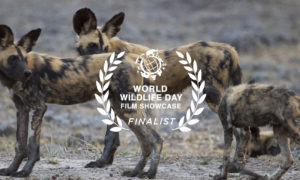
World Wildlife Day Film Showcase: Nature’s Fear Factor | Wednesdays for the Planet
CITES, GEN, Jackson Wild | 2 March 2022 | 13:30 CET | Online
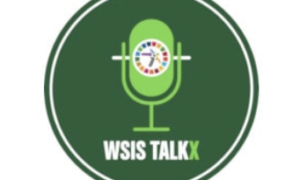
WSIS TalkX | World Wildlife Day
World Summit
on the Information Society | 3 March 2022 | 13:00 CET | Online
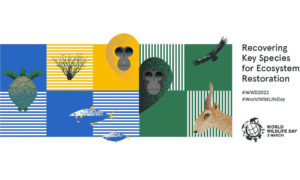
Celebration of World Wildlife Day 2022 “Recovering Key Species for Ecosystem Restoration”
CITES | 3 March 2022 | 14:00 CET | Online

Ciné-ONU: "FIN" online projection
Ciné-ONU | 3 March 2022 | 18:00 CET | Online
Learning

CITES Virtual College
Online | CITES
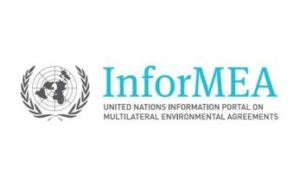
Introductory Course on CITES
Online | InforMEA

Earth School for Kids
Online | UNEP

